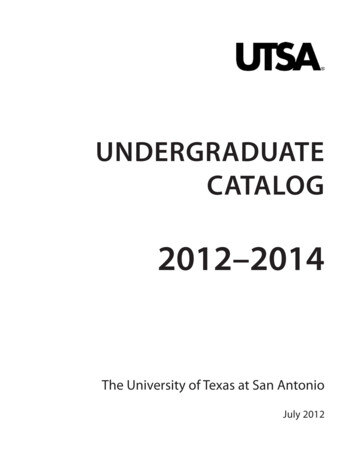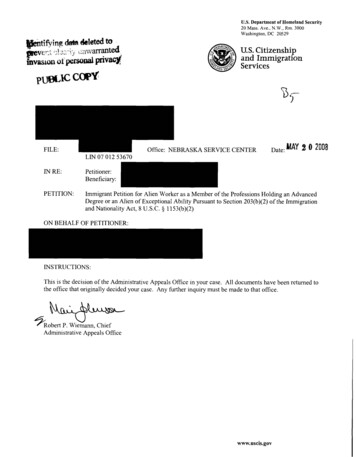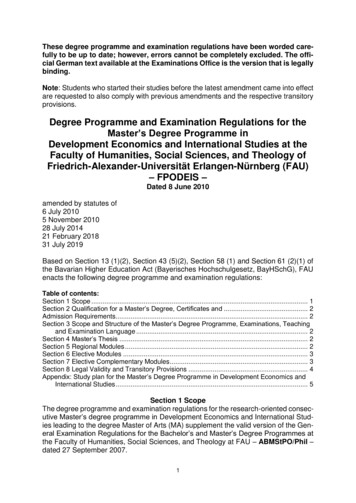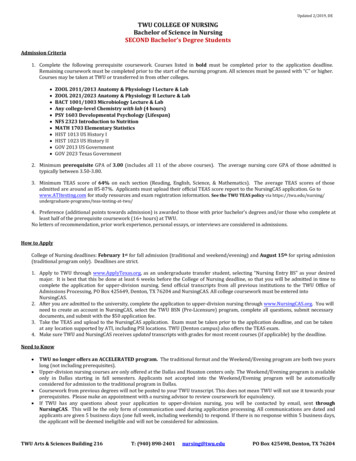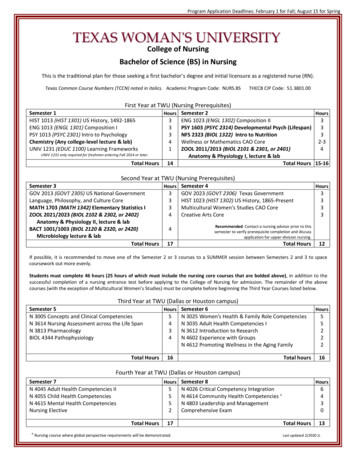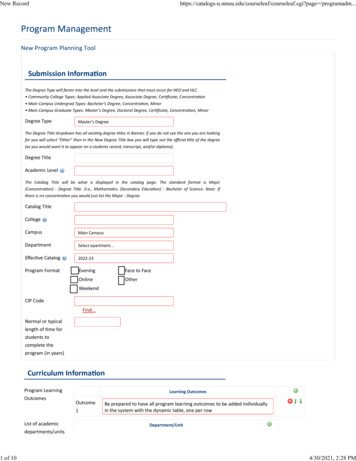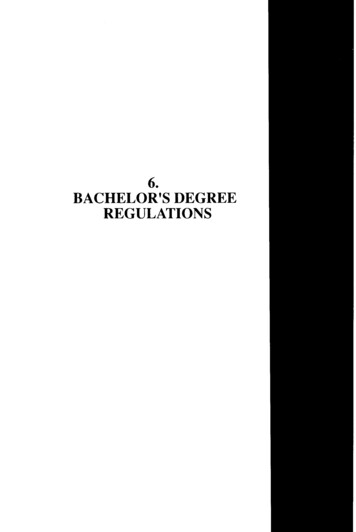
Transcription
6.BACHELOR'S DEGREEREGULATIONS
Degree RequirementsOverall RequirementsMinimum UTSA Residence RequirementCore CurriculumGoalsExpectations of Entering StudentsRhetoricDomain I: Science, Technology, and MathematicsDomain II: Society and CultureDomain III: Literature, the Arts, and LanguageDomain IV: Interdisciplinary StudiesCatalog of GraduationMultiple DegreesPursuing One Degree Covering more than One MajorPursuing Two Degrees ConcurrentlyPursuing Additional Degrees after 19119119TransferringCoursesEvaluation ProceduresResolution of Transfer of Credit DisputesCourse Types and AcceptabilityGenerally AcceptedAccepted on a Limited BasisNot Accepted120120121121121122122Enrollment in Graduate CoursesFor Undergraduate CreditFor Graduate Credit123123123GraduationGraduation DatesApplying for the DegreeGraduation with Honors124124124124
In order to receive a bachelor's degree from UTSA, a student must meet these minimumrequirements:1.Complete a minimum of 120 semester hours of credit, of which at least 39 mustbe in upper-division work.3.Complete the major and support work requirements and the free electiverequirements for the desired degree. Free electives refer to any semester hours ofcredit accepted by UTSA in transfer or awarded by UTSA which, for degreepurposes, are not applied to Core Curriculum, major, minor, or support workrequirements. The restrictions placed upon courses used as free electives are4.a.that a specific number of free elective credits must be at the upper-divisionlevel for some degree programs;b.that a maximum of six hours of physical activities courses can be applied tothe free electives allowed for any UTSA degree program; andc.that a maximum of nine hours of military science credit can be applied tothe free electives allowed for any UTSA degree program.Meet all requirements for a degree as put forth by the Texas State EducationCode, including the following:a.all students must complete six semester hours of American or Texas history.Only three semester hours of credit with a grade of "CR" may be appliedtoward this requirement; andb.all students must complete six semester hours of government or politicalscience which includes the Constitution of the United States and constitutionsof states, with special emphasis on Texas. Only three semester hours ofcredit with a grade of "CR" may be applied toward this requirement.6.Achieve an overall 2.0 grade-point average in all work attempted at UTSA and a2.0 grade-point average in all work included in the major.8.Apply formally for the degree before the deadline in the Office of Admissionsand Registrar and pay the required fee.
The following minimum residence requirements at UTSA are in accordance withrequirements established for all institutions in The University of Texas System andare requirements for all bachelor's degrees.I.A minimum of 30 semester credit hours of UTSA courses must be completedbefore a degree can be conferred.2.Twenty-four of the last 30 semester hours applied to the degree must be completedin residence, with the exception that among The University of Texas Systemcomponents, a student may, with the approval of the appropriate Dean, transferadditional coursework to the program at the degree-granting institution.3.Of the minimum 39 upper-division hours required in all degree programs at UTSA,18 of these must be earned in UTSA courses.4.At least six hours of upper-division coursework in the major must be completedat UTSA. Additional hours in the major sequence may be required under individualUTSA degree plans.The Core Curriculum is the part of each student's degree program in which he or shetakes courses that meet requirements common to all undergraduates at UTSA. Allcandidates for a bachelor's degree at UTSA must achieve Core objectives by completingthe Core Curriculum. Most students will accomplish the Core objectives by fulfillingthe requirements that follow. Students majoring in Art, Architecture, InterdisciplinaryStudies, Interior Design, Music, Civil Engineering, Electrical Engineering, andMechanical Engineering will accomplish Core objectives in a manner specified intheir degree plans.The actual number of courses students need to meet Core Curriculum requirementswill vary, depending on prior preparation and choices made among courses. It isexpected that most students will fulfill the Core Curriculum requirements by completing54 to 55 semester credit hours of course work.The Core Curriculum reflects the educational goals of the University. It is designed toenable students to assess the perspectives and accomplishments of the past and tomove to the future with an informed and flexible outlook. It promotes intellectualadaptability, ethical awareness, and transfer among diverse modes of thought.An essential aim of the Core Curriculum is to cultivate the verbal, numerical, andvisual skills that are necessary to analyze and synthesize information, constructarguments, and identify and solve problems. Another essential aim is to fosterunderstanding of the intellectual and cultural pluralism of modem society as it isreflected in each ofthe following: natural science and mathematics; behavioral, cultural,and social sciences; and language, literature, and artistic expression. By encouraging
interdisciplinary study, the Core Curriculum seeks to develop critical awareness ofthe continuities and discontinuities of human thought, history, and culture, helping toprepare students to meet the demands of change.The University reviews Core courses for their success in promoting the goals of theCore, and it encourages students to select Core courses that will best achieve thesegoals. Beyond the Core, each student must fulfill the requirements of a major.The Core Curriculum is built on the assumption that the foundations of the generalpart of a student's education are laid in secondary school. Appropriate levels ofproficiency in important subjects have been established as prerequisites for many ofthe key courses in the Core, especially in the areas of rhetoric, mathematics, andlanguage. Students who are unable to demonstrate proficiency may be required totake additional coursework before qualifying to take courses that meet Core Curriculumrequirements. Entering students are also expected to possess proficiency in reading,knowledge of research and library tools, and acquaintance with the operation ofmicrocomputers. Students unable to demonstrate such proficiency and knowledge maybe required to enroll in non-credit programs developed by UTSA to correct deficienciesin these areas.To achieve the objectives of the Rhetoric segment, students must demonstratecompetence in writing English; critical proficiency in oral and graphic communication;competence in constructing valid arguments and criticizing arguments; and criticalproficiency in using diverse theoretical perspectives to identify and formulate problemsand draw conclusions.Each student must complete the following courses, for a total of 6 semester credithours:ENGENG10131023Freshman CompositionDiscourse Across the DisciplinesTo achieve the objectives of Domain I, students must demonstrate knowledge of highermathematics sufficient to understand the bases of mathematical reasoning; knowledgeof the methods, intellectual approaches, social significance, and history of the physicaland natural sciences; an understanding of the role of technology and of the relationshipbetween science and technology; and competence in the use of computers and/oracquaintance with the elements of logic.Students will normally complete the requirements for Domain I in 12 semester credithours of coursework.
A.Mathematics. Each student must complete one of the following courses (or anothermathematics course at an equivalent or more advanced lgebra with Calculus for BusinessCollege AlgebraBasic StatisticsBasic Statistics for Business and EconomicsStatistics for PsychologyStatistical Methods for the Life and Social SciencesB. Science and Technology. Each student must complete two courses from thefollowing lists. At least one of the courses must be listed under Level Two.C.Level 331203105320131013110310141203Introduction to Physical AnthropologyIntroduction to ArchaeologyHuman Sex and ReproductionDrugs and SocietyBiology IChemistry of Ordinary ThingsIntroduction to Environmental SystemsThe Third PlanetIntroduction to Earth SystemsIntroduction to Physical SciencesPrinciples of PsychologyLevel 30311231603162319041924Introduction to AstronomyBiology IIPrinciples of EcologyGeneral ChemistryChemical PrinciplesEarth HistoryGeneral Physics IGeneral Physics IITechnical Physics ITechnical Physics IIComputer Science/Logic. Each student must complete one of the followingcourses (3 semester hours):CS1073CSCSCSCSIDS1713*1711 *207320832083IntroductoryComputer Programmingfor ScientificApplicationsIntroduction to Computer ScienceIntroduction to Computer Science LaboratoryComputer Programming with Engineering ApplicationsMicrocomputer ApplicationsTechnology for Liberal Arts and Social Sciences
ISPHI30032043Principles of Information Systems for ManagementIntroductory LogicTo achieve the objectives of Domain II, students must demonstratecriticalunderstanding of the political and economic dimensions of social life; knowledge ofUnited States history sufficient for understanding current developments in Americansociety within a historical context; substantial knowledge of social, racial, cultural,and gender diversity in the United States and Texas; and knowledge of the history,theory, methods, and intellectual approaches of the social and behavioral sciences,including similarities and differences with respect to one another and to other modesof understanding.Students will normally fulfill the requirementshours of course work.A.of Domain II in 18 semester creditUnited States History and Diversity. Each student must complete two of thefollowing courses, for a total of 6 semester credit hours. In meeting thisrequirement, students will fulfill the statutory requirement in United States orTexas history. Only 3 semester hours of credit with a grade of "CR" may beapplied toward this requirement.HISHISHIS104310532053United States History: Pre-Columbus to Civil War EraUnited States History: Civil War Era to PresentTexas HistoryBy taking POL 10 13 and one of the following required courses, students will befulfilling the statutory requirement in United States and Texas government. Onlythree semester hours of credit with a grade of "CR" may be applied toward 3311732023The Politics of the American EconomyEthics in AmericaThe United States in the WorldTexas Politics and SocietyStates, Communities, and Public PolicyCivil Liberties in American Law and PracticeSocial and Behavioral Sciences. Each student must complete one of the followingcourses:AMSANTBBL201310132003Basic Issues in American CultureHuman AdaptationLanguage, Culture, and Society
132013The American Criminal Justice SystemFundamentals of GeographyThe Individual, Family, and CommunitySociety and Social IssuesIntroduction to PsychologyKnowledge and LearningIntroduction to the Study of SocietySocial ProblemsEcaEcaEca200320132023Introduction to Political EconomyIntroductory MacroeconomicsIntroductory MicroeconomicsTo achieve the objectives of Domain III, students should demonstrate functional abilityin the basic skills (listening, speaking, reading, and writing) of a language other thanEnglish; an understanding of the conceptual approaches and history of at least one ofthe arts, as a means of comprehending the aesthetic patterns that underlie humancreativity; and an understanding of literary concepts and contemporary trends ininterpretation, as a way of comprehending the metaphoric or analogical potential ofhuman language.It is expected that most students will fulfill the Domain III requirement in 12 to 13hours of course work. Students may fulfill the requirements of Domain III by taking asfew as 6 semester credit hours of course work if the language requirement is met entirelyby proficiency examination. Students who demonstrate no proficiency in languagesother than English may require up to 17 semester credit hours to complete Domain 333413342333332303231333333333Introduction to Classical LiteratureLiterary Masterpieces of Western Culture ILiterary Masterpieces of Western Culture IIIntroduction to LiteratureLiterary Criticism and AnalysisMinority Voices in American LiteratureLiterature of Texas and the SouthwestFrench Literature in English TranslationFrench Literature and Culture until 1800French Literature and Culture since 1800German Literature in English TranslationGerman Literature and Culture I: Middle Ages to 1700German Literature and Culture II: 1700 to the PresentHebrew Literature in English TranslationWorld Literature I, The Narrative ModeWorld Literature II, Dramatic and Lyric ModesItalian Literature in English TranslationRussian Literature in English TranslationUTSA 1996-98 UndergraduateCatalog
C.SPNSPNSPN331333233333Hispanic Literature I: SpainHispanic Literature II: Spanish AmericaHispanic Literature in English 1332413242336132643266326732683Masterworks in ArtSurvey of Art and Architecture from Prehistoric Times to1350Survey of Art and Architecture in Europe and the NewWorld from 1350 to 1750Survey of Modem ArtHistory of Architecture IHistory of Architecture IIHistory of Modem ArchitectureIntroduction to Opera and OratorioHistory and Styles of JazzHistory and Styles of RockMasterpieces of MusicLanguage. It is expected that most students will have achieved sufficient languagework in secondary school that they will be able to enter at least the second semesterof a language course sequence. Each student must demonstrate proficiency in alanguage other than English by completing a language course at the fourthsemester college level or by achieving an equivalent score on an approvedproficiency examination.NOTICE: UTSA cannot ensure that the Core Curriculum language requirementcourses will be regularly or sequentially offered. Students intending to completethe language requirement of Domain III c., at UTSA by an expected graduationdate should consult with the Tomas Rivera Center for Academic Advising andcarefully plan with their 32103IntermediateIntermediateCulture ntermediateIntermediateIntermediateChinese IILatin IICommunication in a Foreign LanguageFrench-AcceleratedFrench IIGerman-AcceleratedGerman IIHebrew IIItalian IIJapanese IIRussian IISpanish-AcceleratedSpanish IIConversation and Composition
SPN2513Spanish for Special PurposesSPN2523Hispanic Culture and CommunicationNot every course listed ahove is offered on a regular hasis.Students who are not United States citizens and whose native language is not Englishwill be assumed to have completed the language requirement by having completedtwo or more years high school or two or more years tertiary education in a non-Englishlanguage country. Other situations will be handled by petition.To achieve the objectives of Domain IV, students should demonstrate intellectualflexibility, explore the bridges and barriers among various forms of understanding,and understand the nature and limits of different ways of knowing and differentacademic fields. Students should obtain a broad acquaintance with the cultures ofmajor portions of the world (including non-Western cultures), knowledge of the contextsof international relations, and a knowledge of world geography.Students will normally fulfill the requirements of Domain IV by completing 6 semestercredit hours of coursework. Each student must complete one course from each of thefollowing 3320320033003323348932013Architecture and ThoughtIntroduction to Mass CommunicationTopics in Intellectual DiversityScience, Technology, and SocietyHonors Seminar on Diversity of ThoughtModes of Inquiry Across the Fields of StudyScience and HumanityAn Interdisciplinary Approach to Decision MakingManagement Strategy and PolicyIntroduction to Women and Gender 3213Introduction to Cultural AnthropologyArchitecture and CultureEngineering and CivilizationTopics in Cultural DiversityIntroduction to Hispanic CulturesTopics in World CulturesThe Foreign FilmCross-Cultural Communication and Foreign LanguagesWorld Regional GeographyIntroduction to Latin-American CivilizationIntroduction to Islamic CivilizationIntroduction to East Asian CivilizationIntroduction to African CivilizationHonors Seminar on Diversity of CultureUTSA 1996-98 UndergraduateCatalog
ligionsCivilization to the Fifteenth CenturyCivilization since the Fifteenth CenturyPhilosophyStudents have seven years from their term of original registration to complete a degreeprogram under the catalog in effect when they initially registered. If a student dropsout for one or more regular (Fall or Spring) semesters and returns to UTSA as a formerstudent, he or she may choose a subsequent catalog under which to complete graduationrequirements providing the student completed at least one course during a semester inwhich the selected catalog was in effect with a letter grade other than a W, NR, or EP.Choosing a new catalog begins a new seven-year time limit. Students who graduateunder one catalog and begin a second degree must begin the new degree under thecatalog in effect at that time.A student completing one type of baccalaureate degree at UTSA (i.e., Bachelor ofArts, Bachelor of Science, etc.) may elect to complete other majors of that typeconcurrently. In such cases, only one bachelor's degree is awarded, which includes allmajors.If a student wishes to pursue more than one major, all requirements for a single degreeand major, plus the additional requirements for the other major(s), must be completed.It is unlikely that a student fulfilling more than one major can complete all requirementswithin the same number of semester credit hours required for a single major.Students pursuing degrees of different types (i.e., a Bachelor of Arts and a Bachelorof Science) at the same time will be required to follow specific catalog requirementsfor each degree, with only Core Curriculum requirements being used jointly.A student holding a baccalaureate degree from UTSA or from another accreditedinstitution may receive an additional bachelor's degree from UTSA as long as it is ina different major, regardless of the concentration. Such a student continues to beclassified as an undergraduate and mustI.Complete a minimum of 30 semester hours .of credit in UTSA courses (of whichat least 12 must be at the upper-division level in the major field) for eachbaccalaureate degree sought beyond the first.
3.Complete all requirements for the additional degree(s), including grade-pointaverage requirements, Core Curriculum requirements, support courses, electivecourses, and upper-division courses, as set forth in this catalog.4.Complete requirementssecond degree.under the catalog in effect at the time of beginning theUTSA offers formal minors in a variety of disciplines and in several interdisciplinaryfields. Declaration of a minor is entirely voluntary. At least six hours of upper-divisioncoursework in a declared minor must be completed at UTSA. Additional hours in theminor sequence may be required under individual UTSA degree plans. Descriptionsof minor requirements are included in Chapter Seven.To preventencouragedand degreeof coursesunnecessary loss of time and credit, prospective transfer students areto inform themselves as early as possible of UTSA's admission policiesrequirements in their areas of interest. Questions regarding the transferabilityshould be addressed to the UTSA Office of Admissions and Registrar.Students attending community colleges should also note the core curricula designedand adopted by the Texas Higher Education Coordinating Board to simplify the transferof credit. Copies of these core curricula are available through most community collegecounselors.An official Evaluation of Transfer Credit is supplied to each new student as soon aspossible following admission. This evaluation shows the equivalency of coursescompleted elsewhere to courses at UTSA. Students who do not receive transfer creditfor specific courses should review the policies for credit by examination, or contactthe Office of Admissions and Registrar.The Texas Higher Education Coordinating Board has approved core curricula in thefollowing areas: arts and sciences (including mathematics and natural sciences),business administration, engineering, art, and criminal justice. Although the coursestaken in these core curricula at various institutions may not be precisely equivalent tocourses in the UTSA Undergraduate Catalog, students who have successfully completedthese core curricula at other institutions are given full credit toward the appropriatedegree at UTSA.Grades earned at other institutions are not averaged with grades earned at UTSA todetermine an applicant's grade-point average. All courses attempted are used to computethe applicant's grade-point average for admission purposes only.
The Texas Higher Education Coordinating Board has established the followingprocedure to be followed by Texas public colleges and universities in resolving transferof credit disputes for lower-division courses. [The individual courses covered by thisprocedure are defined by the Coordinating Board's guides "Transfer of Credit Policiesand Curricula" and "Common Course Numbering System Guide."]If a transfer course covered by the Coordinating Board policy is not accepted in transferto UTSA, the student should contact the Office of Admissions and Registrar for furtherexplanation. The Admissions Office, the student, and the sending institution will attemptto resolve the transfer of course credit in accordance with Coordinating Board rules.If the transfer credit question is not resolved satisfactorily in the opinion of the studentor the sending institution within 45 days of notification, the Office of Admissions andRegistrar will state the reasons for the course denial to the Commission of HigherEducation. The Commissioner or a designee will then provide a final written decisionabout the transfer course(s) in question to UTSA, the student, and the sending institution.Undergraduate college credits completed at other institutions are evaluated for transferto UTSA by the Office of Admissions and Registrar on the basis of UTSA equivalencytables and according to the guidelines in this section. All work transferred must befrom a college or university accredited by a regional accrediting association. Creditscompleted at foreign institutions are evaluated on an individual basis.Courses from an Accredited College or University. Any academic course from anaccredited college or university in which a passing grade has been earned is acceptedfor transfer credit if it meets all other criteria of this section. Only those hours thatapply toward a specific baccalaureate degree program count toward minimum degreerequirements.The applicability of particular courses completed at other institutions toward specificcourse requirements for a bachelor's degree at UTSA depends upon equivalency ofsuch courses offered by UTSA. Other academic courses are transferred as electives;credit for these courses counts toward minimum degree requirements only if theysatisfy requirements of the student's degree program. Credit is not given for duplicationor repetition of courses.All course requirements at UTSA designated as upper division may be transferred toUTSA only from senior-level institutions. For credit to be transferred as an upperdivision course, the institution where credit was earned must be an accredited seniorlevel institution and the course must be described in the institution's catalog as beingof upper-division level.If the equivalent of a required upper-division UTSA course is completed at an accreditedinstitution as a lower-division course, the course need not be repeated, but another
upper-division course, as approved by the student's adviser, must be completed atUTSA in substitution.Credit by Examination. Credit by examination awarded at another accredited collegeor university will transfer if the institution equates the results of the examination to aspecific course and the course is transferable. Such credit is subject to all other transferprovisions.Physical Activities Courses. Credits earned for physical activities courses can betransferred, within other UTSA transfer provisions,maximum of six semester hours.as free elective credit up to aExtension or Correspondence Courses. Credit earned by extension or correspondencethrough accredited colleges and universities for college-level academic courses isevaluated and accepted for transfer if the course is equivalent to UTSA courses,acceptable to the student's degree program, and all other transfer provisions of thissection are met. However, the maximum credit accepted through a combination ofextensionand correspondencecourses is 30 hours (18-hour maximum bycorrespondence). No more than six hours of correspondence credit may be applied tothe major.Students currently enrolled at UTSA are not normally permitted to take correspondenceor extension courses and transfer the credit to UTSA. Exceptions to this rule must beapproved by the student's adviser and Dean, and such courses can be taken only in theevent that the student is about to graduate and cannot obtain the course in residence.Junior College Courses. Transfer credit for junior college work may not exceed 66semester hours. Students who have completed more than 66 acceptable semester hoursmay apply specific completed, transferable courses to specific course requirements toavoid having to repeat the courses. The semester hours for additional courses may notbe applied toward the minimum semester hour requirements for a baccalaureate degree.Courses from an Institution Undergoing Accreditation or a NonaccreditedInstitution. Credits earned in colleges and universities which are candidates foraccreditation may be considered for transfer to UTSA on an individual basis and asapplicable to the student's degree program. Any such credit accepted in transfer mustbe validated by 30 semester hours of coursework in residence at UTSA, with a gradepoint average of 2.0 or higher in that work.UTSA reserves the right to refuse recognition of credit from a college or universitythat is a candidate for accreditation or from a nonaccredited institution.Remedial, Orientation, Life Experience, High-School Level, Below-AlgebraMathematics, or Vocational-Technical Courses. Credits for courses such as remedialcourses, orientation, life experience, high-schoolUTSA 1996-98 Undergraduatelevel courses, mathematicsCatalogbelow
the college algebra level, or vocational-technical courses are not acceptable for transfercredit. Where vocational-technical courses support a student's degree program, thestudent may make a written request to the Dean of the College to approve those coursesas free elective credit. No transfer credit is granted for the General EducationalDevelopment (GED) test.Military Service Training School Courses. Transfer credit for military service trainingschool courses is not granted by UTSA. A student having taken such courses maychallenge by examination those UTSA courses that appear equivalent to those alreadycompleted (see Challenge by Examination in the General Academic Regulations chapterof this catalog). Credit for R.o.T.e. or military science, when awarded by anotheraccredited college or university, will be accepted by UTSA as free elective creditwithin the limitations of the student's degree program (to a maximum of 9 semesterhours). See individual degree requirements and the R.o.T.e. program requirements inthis catalog for limits on military science courses as free electives.With approval of the student's adviser, the instructor, the Division Director, and theDean of the College in which the course is offered, an exceptional undergraduatestudent may enroll in a graduate course and apply the credit earned to an undergraduatedegree. Approval forms are available in the Deans' offices.An undergraduate student lacking no more than 12 semester hours for graduation mayenroll in a graduate course and earn graduate credit under the following conditions:1.All hours required for the student's undergraduate degree must be completed inthe term in which the graduate course is being taken.2.In order to earn graduate credit, the student must graduate at the end of the semesterin which the course(s) are taken; otherwise, the course(s) will count asundergraduate credit.3.If graduate credit is earned, the semester hours are not considered part of thebaccalaureate degree program.4.The student must obtain permission from the student's adviser and the Deanthe College in which the course(s) to be taken is offered. An approval formavailable in the Deans' offices. The form must be filed with the OfficeAdmissions and Registrar by the time of registration. Students are encouragedbegin seeking appropriate authorizations prior to the registration period.ofisofto
Degrees are conferred at the end of each semester and at the en
The following minimum residence requirements at UTSA are in accordance with requirements established for all institutions in The University of Texas System and are requirements for all bachelor's degrees. I. A minimum of 30 semester credit hours of UTSA cours
